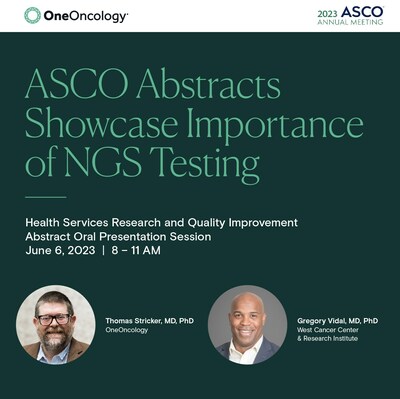|
25.05.2023 23:36:00
|
OneOncology Presents Abstracts at ASCO Highlighting Importance of Increasing NGS Testing
- Research Presented by Dr. Thomas Stricker Suggests Oncologists Should Switch to Targeted Treatment if BiomarkerTesting Identifies Actionable Mutation Even After First-Line Treatment on Non-targeted treatment Has Begun
- Research Led by Dr. Gregory Vidal Evidences Identifies Inequities by Community Practice and Provider Levelsin Accessing NGS Testing Among Black and Latinx Patients
NASHVILLE, Tenn., May 25, 2023 /PRNewswire/ -- At the 2023 ASCO annual meeting, investigators from OneOncology's clinical team will present Oral Abstracts using real-world data to evidence better health outcomes when advanced Non-Small Cell Lung Cancer (aNCSLC) patients receive biomarker testing, including Next-Generation Sequencing (NGS) testing, to determine whether the patient has an actionable driver oncogene for a targeted therapy, even if a non-targeted therapy has begun, as well as the current inequities in receiving NGS testing between White, Black, and Latinx populations.
OneOncology Presents Abstracts at ASCO Highlighting Importance of Increasing NGS TestingThomas Stricker, MD, Ph.D., Medical Director of Precision Medicine for OneOncology, is the first author of Abstract 6507, Clinical Value of Timely Treatment for Advanced Non-Small Cell Lung Cancer Patients (aNSCLC) with Actionable Driver Oncogenes, which observed better health outcomes for aNSCLC patients who began therapy with a targeted treatment compared with non-targeted treatment. The research also showed comparable outcomes to Upfront targeted treatment for aNSCLC patients who switched to targeted therapy within 42 days after biomarker testing result was available, even if the patient had already begun a non-targeted treatment, such as chemotherapy.
"Our research shows that oncologists should use, and act upon biomarker information, as soon as possible – even if it is after a non-targeted treatment has begun," said Dr. Stricker. "While it's crucial we improve utilization of NGS testing to identify all actionable driver oncogenes upfront, so that we can deliver the right therapy to the right patient at the right time, this work shows that even if the initial result is delayed and the patient is started on a non-targeted therapy, switching to the targeted therapy that is suggested by the NGS results has benefit for the patient."
Dr. Stricker's research examined the Flatiron Health de-identified electronic health record data of 5,156 NSCLC patients with an actionable cancer gene. Seventy-nine percent were treated in the community setting, and 56 percent received NGS testing.
In Abstract 6508, Practice-and Provider-Level Inequities in Next-Generation Sequencing Testing by Race/Ethnicity for Patients with aNSCLC in the Community Setting, first author, Gregory Vidal, M.D., Ph.D., Chair of Breast Cancer Disease Group, OneOncology, and Director of Clinical Research, West Cancer Center & Research Institute. His team found by examining Flatiron Health de-identified electronic health record data that inequities at the provider and practice levels were meaningful contributors to the inequitable utilization of NGS among Black, Latinx, and White patients with advanced Non-Small Cell Lung Cancer.
Dr. Vidal's research has important implications, as healthcare delivery experts move "from characterizing inequities to designing, implementing, and evaluating interventions and policies aimed at improving equitable, timely NGS testing as a quality-of-care metric" in aNSCLC patients specifically, and all cancer patients, generally.
"Our findings show the racial/ethnic inequities in NGS testing were driven by within- and across-practice inequalities, as well as across-provider inequities, which could potentially reflect system barriers to access to care," Dr. Vidal said. "Our research points to the need for systematic program interventions and policies to improve timely access to NGS testing among Black and Latinx patients."
The study's result of 12,045 patients diagnosed with aNSCLC (9,981 White, 1,528 Black, and 536 Latinx) showed that within and between practices inequities contributed to total inequity in NGS testing for Black patients (48 percent and 52 percent of total inequity mean percentage-point of 7.49), and Latinx patients (60 percent and 40 percent of total inequity mean percentage-point of 8.26) compared with White patients.
Dr. Vidal's research builds upon earlier OneOncology research, that showed OneOncology had a higher NGS uptake with a shorter time to testing in metastatic breast cancer than non-OneOncology community cancer centers, possibly related to OneOncology's network-wide strategy recommending NGS testing at diagnosis of advanced disease. These studies highlight the importance of built-in processes that recommend NGS testing and alert physicians when additional testing may be necessary—an effort that is actively being led by OneOncology's Precision Medicine team.
Both studies were conducted with Genentech, a member of the Roche Group, as part of a multi-year strategic partnership to collaborate on various clinical trials, scientific research, and real-world data studies advancing personalized cancer care in community oncology centers. OneOncology partner practices that participated in Dr. Stricker's study include Mary Bird Perkins, Eastern Connecticut Hematology & Oncology Associates, West Cancer Center and Research Institute, New York Cancer and Blood Specialists, Astera Cancer Care, Los Angeles Cancer Network, and Tennessee Oncology.
Drs. Stricker and Vidal will each present their Abstracts during the June 6 Health Services Research and Quality Improvement Abstract Oral Presentation Session from 8:00 AM – 11:00 AM.
To set up an interview at ASCO, contact Eric Hoffman, ehoffman@oneoncology.com.
About OneOncology
OneOncology was founded by community oncologists, for community oncologists, with the mission of improving the lives of everyone living with cancer. Our goal is to enable community oncology practices to remain independent and to improve patient access to care in their communities, all at a lower cost than in the hospital setting. OneOncology supports our platform of community oncology practices through group purchasing, operational optimization, practice growth, and clinical innovation. Our 960 cancer care providers care for approximately 548,000 patients at more than 310 sites of care nationwide. To learn more, visit oneoncology.com orLinkedIn.
![]() View original content to download multimedia:https://www.prnewswire.com/news-releases/oneoncology-presents-abstracts-at-asco-highlighting-importance-of-increasing-ngs-testing-301835198.html
View original content to download multimedia:https://www.prnewswire.com/news-releases/oneoncology-presents-abstracts-at-asco-highlighting-importance-of-increasing-ngs-testing-301835198.html
SOURCE OneOncology
 Der finanzen.at Ratgeber für Aktien!
Der finanzen.at Ratgeber für Aktien!
Wenn Sie mehr über das Thema Aktien erfahren wollen, finden Sie in unserem Ratgeber viele interessante Artikel dazu!
Jetzt informieren!

